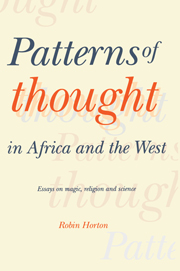7 - African traditional thought and Western science
Published online by Cambridge University Press: 05 June 2012
Summary
From tradition to science
The first part of this paper seeks to develop an approach to traditional African thought already sketched in several previous contributions to this journal. My approach to this topic is strongly influenced by the feeling that social anthropologists have often failed to understand traditional religious thought for two main reasons. First, many of them have been unfamiliar with the theoretical thinking of their own culture. This has deprived them of a vital key to understanding. For certain aspects of such thinking are the counterparts of those very features of traditional thought which they have tended to find most puzzling. Secondly, even those familiar with theoretical thinking in their own culture have failed to recognize its African equivalents, simply because they have been blinded by a difference of idiom. Like Consul Hutchinson wandering among the Bubis of Fernando Po, they have taken a language very remote from their own to be no language at all.
My approach is also guided by the conviction that an exhaustive exploration of features common to modern Western and traditional African thought should come before the enumeration of differences. By taking things in this order, we shall be less likely to mistake differences of idiom for differences of substance, and more likely to end up identifying those features which really do distinguish one kind of thought from the other.
- Type
- Chapter
- Information
- Patterns of Thought in Africa and the WestEssays on Magic, Religion and Science, pp. 197 - 258Publisher: Cambridge University PressPrint publication year: 1993
- 2
- Cited by



